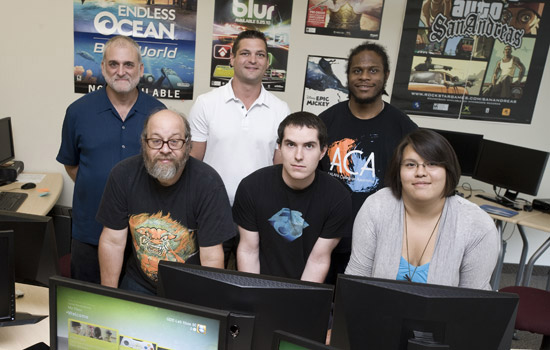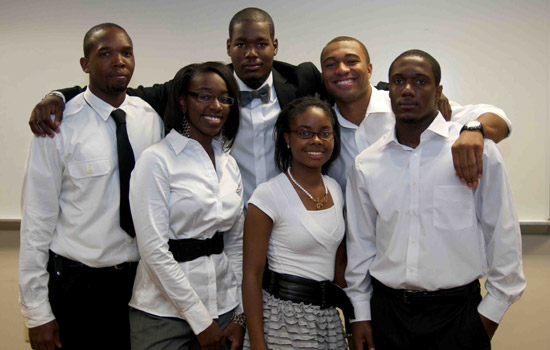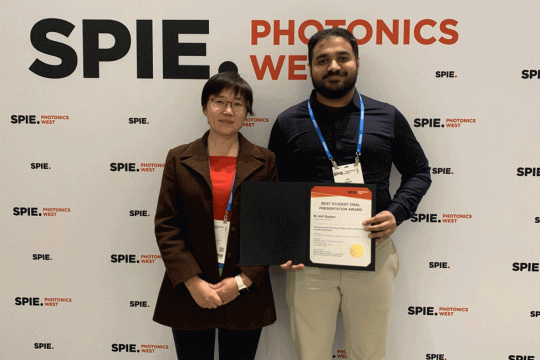Students raise the bar on good grades with the Academic Challenge
Pilot study-group initiative by AALANA students to improve grades provides friendly competition, academic support
John Rube
Members of the Black Awareness Coordinating Committee are partners in the Academic Challenge. Its current president, Marcus Lowe (far right) helped launch the program with Kenneth Stewart. From left are Justin Mann, Racquel Lett, Kenneth Davis, Dannea Dixon, Obinna Ukachukwu and Lowe.
For Kenneth Stewart and Marcus Lowe, peer pressure is strong but positive motivation.
It was this positive motivation that became the foundation for the Academic Challenge, a study-group initiative the two students organized last fall. The challenge is a way to support RIT’s African-American, Latino-American and Native-American students who they say are sometimes unaware of the many academic resources available to them, or just too shy to take the first step in acquiring help.
“The AALANA community doesn’t take advantage of all these resources, and I started inquiring why,” says Stewart, who also saw that as a group, the 1,700 AALANA students at RIT had, on average, a 2.7 grade point average. He thought something could be done to improve upon that. “One thing I realized we did do well is congregate in groups, so I was trying to think of a way where we can still do this and be academically successful as well.”
Lowe agreed. “This has become a student-driven community effort.”
The Academic Challenge is a grassroots effort where teams of students band together, learn about academic support resources on campus and, most importantly, provide support to each other for homework, projects and research. There are currently five teams of six to eight people, each with a group leader, who meet regularly on campus for a minimum of eight hours per week on pre-determined days and times.
When students first questioned the time required, Stewart explained that some homework problems take a few hours to solve, so the eight hours per week required is not an unreasonable commitment, and that working together can improve learning and success. Tests and quizzes are reviewed within the small group setting. Leaders recommend help in certain areas and, when in doubt, look to the AALANA Collegiate Association and the Black Awareness Coordinating Committee, the two student organizations that founded and launched the challenge, or the Multicultural Center for Academic Success, to provide resources.
At the outset, the students provided current GPAs. At the end of the pilot this spring, the project sponsors will recognize the most improved individual students and groups.
When Stewart first began at RIT in 2008, he says he had limited involvement with campus student groups. It wasn’t until he traveled to Australia in his second year as part of a study abroad experience that he began to see that class time and homework were only a small part of the college experience.
“Being taken out of your regular social and cultural bubble and being put into a world where you have no experience teaches you who you are and what you can do. I learned that what I can do is limitless, and what I can’t do is infinitesimally small,” says the Washington, D.C., native. “Coming back from Australia, I had the realization that I wanted to get more into student life.”
He ran for president of the AALANA Collegiate Association and is currently serving his second term with the major student organization. He expects to graduate in 2013 with a double major in computer science and game design and with a double minor in Japanese and mathematics.
Lowe, a fourth-year management information systems major and president of the Black Awareness Coordinating Committee, says he realized that there were people that looked up to him and encouraged him to be successful. This motivated him personally and persuaded him to sow the seeds of this encouragement for others.
Lowe, whose family traveled a great deal while his father was in the Air Force, was born in Texas and grew up in Anchorage, Alaska. His family has since returned to Texas, settling in Houston.
“My younger brother and sister serve as my greatest source of inspiration,” says Lowe. “They look up to me, and if they can’t look up to me, then I’ve failed. And the core group of friends I have now at RIT helped me get involved. That’s also why I feel so strongly that the positive peer pressure is the biggest aspect of the Academic Challenge. We force each other to do better, to be better.”
Stewart and Lowe have since discovered that there is a wide circle of mentors and leadership opportunities—and both young men are set to share this information and support to others. The process of improving GPAs is important to the challenge teams, but it is also an opportunity to bring along new leaders, to get students who wouldn’t otherwise meet or get involved in campus organizations to aspire to be a part of student clubs—and take on leadership roles.
“The amount of thought Kenneth and Marcus have put into this program is truly remarkable,” says Quinn Karley, interim assistant director for student support and special projects in the Multicultural Center for Academic Success. “Not only are they passionate about academics, but they are sincerely devoted to helping others here at RIT, taking time to really listen to them and encourage them.”
The GPAs are incidental to personal pride and being well integrated into the RIT community, Stewart adds.
“If you are in an environment where everyone around you is actually doing work, it compels you to do more work,” he says. “It’s peer pressure, but in a positive light.”
Note: Contact Stewart at kis7255@rit.edu or Lowe at marcuslowe2@gmail.com for more information about the Academic Challenge.
 Kenneth Stewart was part of the RIT and St. John Fisher College teams that developed a computer game that enhances the experience of therapy for young people with anxiety. Team members include, clockwise, from back left, Dr. Laurence Sugarman, Robert Rice, Stewart, Ivy Ngo, John McDonald and Stephen Jacobs. A. Sue Weisler
Kenneth Stewart was part of the RIT and St. John Fisher College teams that developed a computer game that enhances the experience of therapy for young people with anxiety. Team members include, clockwise, from back left, Dr. Laurence Sugarman, Robert Rice, Stewart, Ivy Ngo, John McDonald and Stephen Jacobs. A. Sue Weisler












